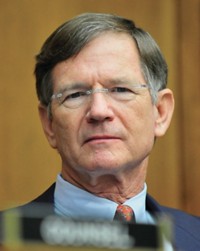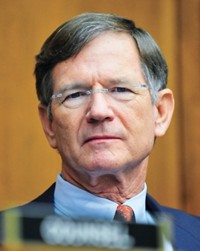Advertisement
Grab your lab coat. Let's get started
Welcome!
Welcome!
Create an account below to get 6 C&EN articles per month, receive newsletters and more - all free.
It seems this is your first time logging in online. Please enter the following information to continue.
As an ACS member you automatically get access to this site. All we need is few more details to create your reading experience.
Not you? Sign in with a different account.
Not you? Sign in with a different account.
ERROR 1
ERROR 1
ERROR 2
ERROR 2
ERROR 2
ERROR 2
ERROR 2
Password and Confirm password must match.
If you have an ACS member number, please enter it here so we can link this account to your membership. (optional)
ERROR 2
ACS values your privacy. By submitting your information, you are gaining access to C&EN and subscribing to our weekly newsletter. We use the information you provide to make your reading experience better, and we will never sell your data to third party members.
Policy
House Science Committee Chair Pummeled Science Agencies
Funding: Texas Republican Lamar Smith launched investigations into NSF, EPA, and NOAA
by Andrea Widener
December 21, 2015
| A version of this story appeared in
Volume 93, Issue 49
Rep. Lamar Smith (R-Texas) isn’t one to back down from a skirmish with the science community. In 2015, the chair of the House of Representatives Science, Space & Technology Committee has continued to investigate research and policy at several science agencies, despite pushback from science advocacy groups.
Earlier this year, Smith and the National Science Foundation came to a détente over his two-year-long investigation into several NSF grants—primarily social sciences and climate change research—that Smith found objectionable.
Smith also asked for changes in NSF’s peer review process, including forcing NSF employees to personally certify that any grant the agency gives is in the national interest. Science organizations feared that interference could take NSF away from its basic mission and deter scientists from pursuing research without a clear outcome.
NSF and Smith eventually overcame their stalemate when Director France Córdova conceded that NSF’s original charter was broad enough to cover the national interest. Even after they agreed, Smith introduced a bill to require that grants be in the national interest, but it was never taken up in the Senate.
Smith has targeted several other agencies at different times, including the Environmental Protection Agency and its water quality rules and science advisory process. But his biggest target is the National Oceanic & Atmospheric Administration, whose researchers published a climate change paper in the journal Science that showed there was no pause in Earth’s rising temperatures. Smith says that paper was published for political rather than scientific reasons and has subpoenaed agency e-mails and documents.
NOAA’s leaders have said they will not turn over the documents. Science organizations fear doing so would deter scientists from doing research into important policy questions.
C&EN's YEAR IN REVIEW
Top Headlines of 2015
- Chemical Makers Looked To Big Deals
- NASA Got Up Close And Personal With Pluto
- Opposition To Neonicotinoids Intensified
- 2015 Nobel Prizes In Science At A Glance
- Climate Pact Clinched
- Little Good News For Chemistry Job Outlook In 2015
- Pfizer To Merge Again, This Time With Allergan
- Oil And Gas Industry Under Pressure
- Greening Up Fracking
- An Industry In Spin Cycle
- Finally, Emoji For Chemists
- A Big Deal For Chemists
- Tianjin Explosion Put Spotlight On Safety
- Women Assumed Leadership Roles At American Chemical Society
- Artificial Ingredients In The Crosshairs
- Jacqueline K. Barton, Unwavering Chemistry Champion
- House Science Committee Chair Pummeled Science Agencies
- NIST Veteran Became U.S. Government's Top Chemist
- Gene-Editing Technique Raised Ethics Questions
- World Chemical Production At A Glance
- Classroom Fires During Science Demonstrations Spark Concern
- Climate Was Right For Deal-Making
- American Chemical Society Dives Deeper Into Open Access With The Debut Of ACS Omega
- Lego Began Research On Switching To A Biobased Plastic
- New Chair Took The Helm At Troubled Chemical Safety Board
- Genetically Modified Foods In The Spotlight
- Overhaul Of U.S. Chemical Law Moved
- ACS Scholars Program Turned 20
- American Chemical Society Expanded Its Global Reach
- Scientists Called For Standardized Antibodies
Top Research of 2015
- Flexible Electronics You Can Inject
- Special Delivery For Sensitive Reagents
- Yeast Programmed For Opioid Total Synthesis
- Miracle Machine Builds Molecules On Demand
- Nickel Shines As A Catalyst
- 3-D Printing Takes On A New Dimension
- Atomically Thin Films Grow In Number
- Digging In The Dirt Yields Novel Bacteria Fighter
- Keeping GMOs On A Leash
- A Liquid With Holes In It
- Electron Microscopy Provides Unprecedented Close-ups
Revisiting Research of 2005





Join the conversation
Contact the reporter
Submit a Letter to the Editor for publication
Engage with us on Twitter